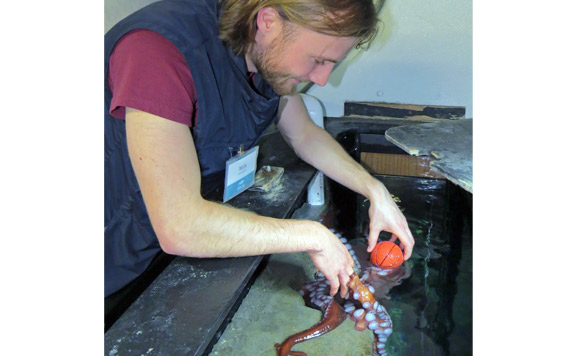by Tina Kelly –
Are their eyes weepy? Are there any noticeable changes in the colour of their skin or thickness of their fur? Check the condition of their paw pads and look for tartar buildup on their teeth. These are all important wellness checks when your pet is a four-legged mammal, but not at all helpful when it is an octopus.
Lead Aquarist, Nick, qualifies as having a one-of-a-kind job. Caring for thousands of animals, from the smallest sea monkeys to our largest resident – the giant Pacific octopus – is not only unique but critical.
But before you can care for an octopus, you need to have one, so scientific divers take the plunge to find an octopus. After gently and ethically collecting a suitably-sized octopus, extreme care is taken to transport it to the Centre.
So how do you care for a cephalopod? Feeding time offers Nick the best opportunity to conduct a health check. When the habitat lid is removed, curious octopuses opt to interact and Nick takes this time to examine the arms and check the skin for abrasions or scratches it may have arrived with or received from a too-close encounter with a sea urchin or a crab. Daily behavioural observations are another way to ensure the octopus is healthy.
Optimal pet health requires quality food. The giant Pacific octopus receives a variety of top-notch sustainable protein – prawns, clams, squid and their favourite prey: crab. Live crabs are ideal: this helps maintain the ability to hunt. Live crab are offered tucked inside a sealed jar. Known to scientists as extremely intelligent invertebrates, the puzzle of jar opening offers some stimulation. Duplo blocks along with dog toys and Kongs also add to what is described as enrichment for the octopus’ mind.
During his six-plus year tenure, Nick has cared for many octopuses – Emily, Norm, Mo, Sidney, Hermione, Steve, Jar Jar, Sylvia, Polkadot, Nellie – and observed what could only be likened to individual personality traits. Anthropomorphism may make some scientists cringe, but Nick is willing to note some were cheeky, some were feisty and some definitely more playful. And then there was the octopus who would squirt Nick, but no other member of the animal care team. When pressed to name a favourite Nick hesitates, then answers: “the current one is always my favourite.”
Saying goodbye to an octopus is bittersweet. After their four- to six-month stint at the Centre, Nick knows them well – their likes and dislikes, their quirks and their favourite foods and toys. But he also knows giant Pacific octopus reproduce only once before their end of life and recognizes the importance for that to happen in the wild. After receiving approval from a veterinarian and the Department of Fisheries and Oceans, Nick recently returned Nellie to Tofino where she had been collected. Ideally, on the same trip, a new smaller octopus is collected and the process is repeated. This trip was no exception.
Nick returned with a new octopus to care for and a new octopus to act temporarily as a steward for ocean education and conservation.
Salish Sea School summer camps go behind the scenes to learn about animal care. Registration on now! salishseacentre.org.




